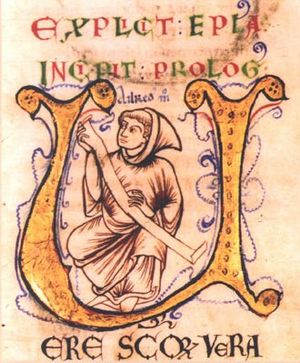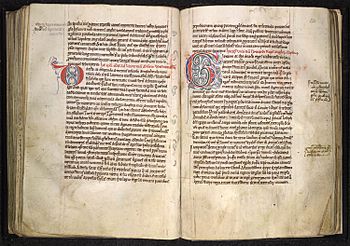Aelred of Rievaulx facts for kids
Quick facts for kids SaintAelred of Rievaulx O Cist. |
|
|---|---|
 |
|
| Abbot of Rievaulx | |
| Born | 1110 Hexham, Northumberland, England |
| Died | 12 January 1167 (aged 56–57) Rievaulx, Yorkshire, England |
| Resting place | Rievaulx chapter house next to William, first abbot |
| Venerated in | Catholic Church; Anglican Communion |
| Major shrine | Rievaulx Abbey, Yorkshire, England (ruinous) |
| Feast | 12 January |
| Attributes | Abbot holding a book |
| Patronage | bladder stone sufferers |
Aelred of Rievaulx (pronounced AY-lred of REE-voh), also known as Ailred or Ælred, was an English Cistercian monk. He lived from 1110 to 1167. He became the abbot of Rievaulx Abbey in 1147 and was a famous writer. Both Anglicans and Catholics consider him a saint.
Contents
Life of Aelred

Aelred was born in Hexham, England, in 1110. His father, Eilaf, was a priest. Aelred likely went to school at Durham Cathedral.
When he was about 14, Aelred went to work at the court of King David I of Scotland. He became a "steward," which meant he helped manage the king's household. At age 24, in 1134, he left the court. He decided to join the Cistercian abbey of Rievaulx in Yorkshire. Cistercians are a type of Christian monk who live in communities called abbeys.
In 1138, Aelred helped with important talks. He went with the abbot of Rievaulx to the Scottish border. They were there to discuss giving a castle to the Scottish king. Aelred realized that leaving his friends at court was hard. He believed true friendship comes from Christ.
In 1142, Aelred traveled to Rome. He went to speak to Pope Innocent II. He represented church leaders who disagreed with a new archbishop being chosen for York. These talks went on for many years.
When he returned, Aelred became a "novice master" at Rievaulx. This meant he taught new monks. In 1143, he became the abbot of a new abbey called Revesby Abbey. This abbey was a "daughter house" of Rievaulx, meaning it was started by Rievaulx.
In 1147, Aelred was chosen to be the abbot of Rievaulx Abbey itself. He stayed in this role until he died. Under his leadership, the abbey grew very large. It had about 140 monks and 500 other people who helped with the abbey's work.
As an abbot, Aelred had to travel a lot. He visited other Cistercian abbeys. He also had to go to France each year for a big meeting of the Cistercian Order.
Aelred was also involved in politics. He helped King Henry II of England support a certain pope. This helped that pope, Pope Alexander III, become officially recognized in 1161.
Aelred wrote many important books about faith. Two famous ones are Speculum caritatis ("The Mirror of Charity") and De spiritali amicitia ("On Spiritual Friendship"). He also wrote seven history books. Three of these gave advice to King Henry II on how to be a good king.
In his later years, Aelred suffered from kidney stones and arthritis. He was allowed to live in a special building near the abbey's infirmary (sick room).
Aelred died on January 12, 1167, at Rievaulx.
Spiritual Friendship
Aelred's most famous book is De spirituali amicitia, which means "Spiritual Friendship." This book is about how Christians can have true friendships. Aelred believed that Christ is the most important part of any spiritual friendship.
Aelred was inspired by an ancient Roman writer named Cicero. Cicero wrote about friendship, saying it should involve real trust and affection. Aelred also learned from Augustine of Hippo, another famous Christian writer. Augustine wrote about different kinds of friendships. He said that as people grow up, their friendships change. Young friendships might be about having fun together. Later, friendships can be based on shared interests and learning from each other. For Augustine, the best friendships help people grow closer to Christ.
In his book, Aelred used a dialogue style, like a conversation. He wrote about how the joy of friends can be very sweet. He believed that nothing felt better than to love and be loved.
Aelred's Legacy
Aelred was never officially made a saint in the way it's done today. However, people in northern England began to honor him as a saint. The Cistercian Order officially recognized him in 1476. His body was kept at Rievaulx Abbey.
In the 1500s, a writer named John Leland said he saw Aelred's shrine. He said it was shining with gold and silver. Today, the Catholic Church lists Aelred of Rievaulx as a saint. His feast day is January 12. Other Christian churches also remember him on this day.
Much of what we know about Aelred comes from a book called Life of Aelred written by Walter Daniel. Aelred's own book, Life of Saint Edward, King and Confessor, was also very famous for many centuries.
The Church of England and the Episcopal Church remember Aelred with special services on January 12.
Patronage
- A Catholic church in Bishop, Georgia, is named after Saint Aelred.
- A primary school in York is named after him.
- There was a secondary school named after him in Scotland and another in England, but they are now closed.
- Since 2019, there has been a hermitage (a place for religious retreat) named after him in Jever, Germany.
Writings

Aelred was known for his writing and for leading the abbey. A historian named David Knowles called him the "St. Bernard of the North." He also said Aelred was a "singularly attractive figure." Knowles felt that no other English monk from the 1100s was as memorable.
Many of Aelred's works have been translated into English and French. More translations of his sermons are still being published.
Here are some of Aelred's important works:
- Histories and biographies
- Life of David, King of the Scots (written around 1153).
- Genealogy of the Kings of the English (written 1153–54).
- On the Account of the Standard (about a battle, 1153–54).
- The Life of Saint Edward, King and Confessor (1161–63).
- The Life of Saint Ninian (1154–60).
- On the Miracles of the Church of Hexham (around 1155).
- Spiritual writings
- The Mirror of Charity (around 1142).
- Jesus as a Boy of Twelve (around 1160–62).
- Spiritual Friendship (1164–67).
- The Formation of Anchoresses (advice for women living alone for religious reasons, around 1160–62).
- Pastoral Prayer (around 1163–67).
- On the Soul (around 1164–67).
- Sermons
- Aelred wrote many sermons. These were often for special church days.
- He also wrote a long commentary on parts of the Bible.
See Also
- List of Cistercian monasteries in England
Images for kids



